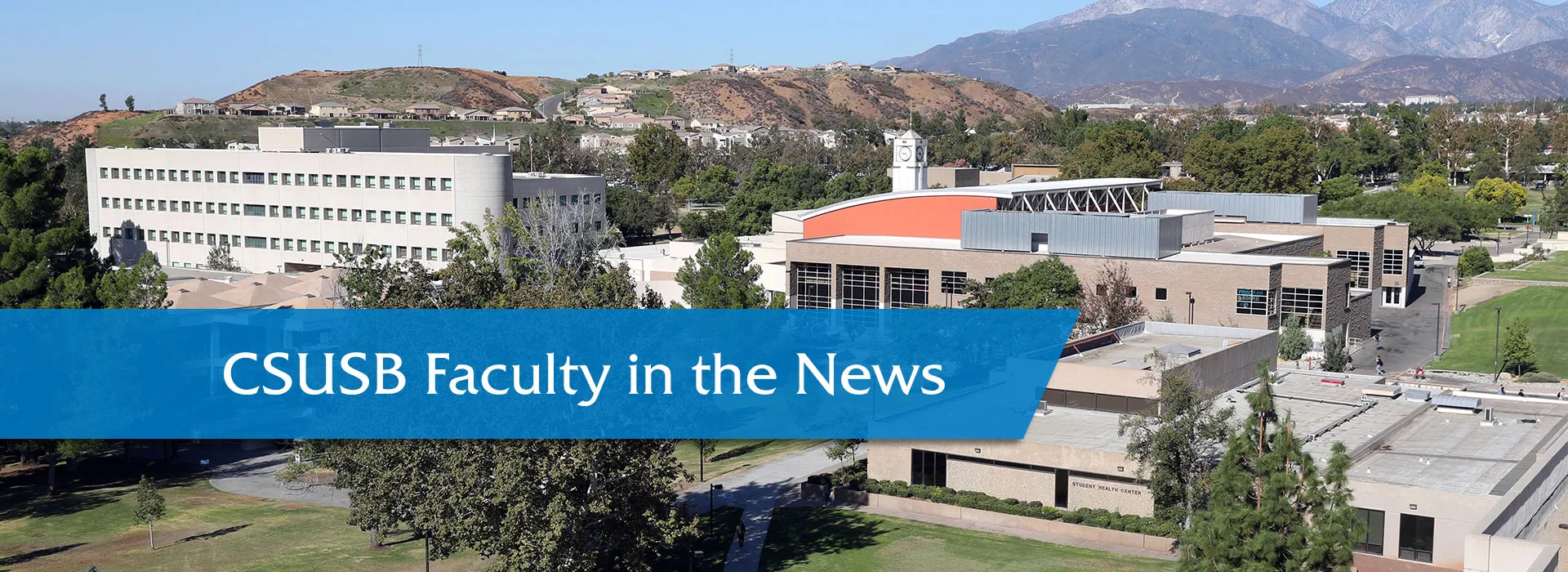
NOTE: Faculty, if you are interviewed and quoted by news media, or if your work has been cited, and you have an online link to the article or video, please let us know. Contact us at news@csusb.edu.
Two of Cal State San Bernardino’s institutes and centers were the source of news this week.
The Institute for Applied Research and Policy Analysis, housed in the Jack H. Brown College of Business and Public Administration, reported that the Inland Empire’s economy continued to progress at a strong pace, The Sun reported on April 4.
Barbara Sirotnik, a statistics professor and author of the institute’s monthly Purchasing Managers Index report, said data from manufacturing company purchasing managers indicate positive signs for the local economy, with the uptick in orders showing customers are buying locally-made products.
The complete article may be read at “Straight from Inland Empire manufacturers’ mouths: Economy is looking up.”
“This is a very strong report,” The Sun quoted Sirotnik as saying. “Obviously, there have been increases in all of the major parts of the (report). I do expect next month should fall back a little bit because this month was so strong.”
The city of Los Angeles was the focus of two news reports that examined hate crimes there, based on the latest study from CSUSB’s Center for the Study of Hate and Extremism.
The Los Angeles Daily news reported on April 4 that Los Angeles experienced a 15 percent increase in hate crimes in 2016, along with a significant spike in attacks against the gay, lesbian, bisexual and transgender communities, according to data analyzed by the Center for the Study of Hate and Extremism at Cal State San Bernardino.
The number of hate crimes rose from 200 in 2015 to 230 in 2016, the highest number of hate crimes seen in Los Angeles since 2008, said Brian Levin, the center’s director. But it’s well below the 559 hate crimes the city saw in 2001, the year of the Sept. 11 terror attacks, which was the highest number this century.
Levin, a criminal justice professor, said the surge in hate crimes is largely due to a spike in violent aggravated assaults, racially and ethnically motivated crimes and crimes against LGBT communities. “Perhaps most disturbing is the surge in the most violent type of attacks, which are aggravated assaults,” Levin said. “Whether it’s the increase in aggravated assaults or criminal threats, it appears that assailants are emboldened.”
That article may be read at “Hate crimes rise 15 percent in LA with uptick in LGBT victims.”
CBS LA (KCBS Channel 2/KCAL Channel 9) quoted Levin as saying, “Catalytic or national events can impact the number of hate crimes, but so do local events, economics and individual conflicts at the neighborhood level. It’s a combination of things.”
And Kevin Grisham, the center’s assistant director for research and associate professor of geography and environmental studies, was quoted as saying, “The city of Los Angeles prides itself on being a multicultural haven. It’s troubling to see significant increases in these crimes.”
The CBS LA article may be read at “Study: Hate crimes soaring in city of Los Angeles.” City News Service also published the article at “Hate crimes soar in LA area, but attacks on Jews, Muslims decline.”
And an article about 13 U.S. Democratic senators calling on the Trump administration to form a task force to combat an increase in hate-inspired violence nationwide cited a report from the Center for the Study of Hate and Extremism at California State University, San Bernardino, which found a 87.5 percent increase in hate crimes against Muslims in the days directly following Trump’s 2015 proposal to ban Muslims from entering the U.S. Trump made the proposal after the Dec. 2, 2015, terror attack in San Bernardino.
The article, published April 4, may be read at “Senators put pressure on Trump to create hate crime task force.”